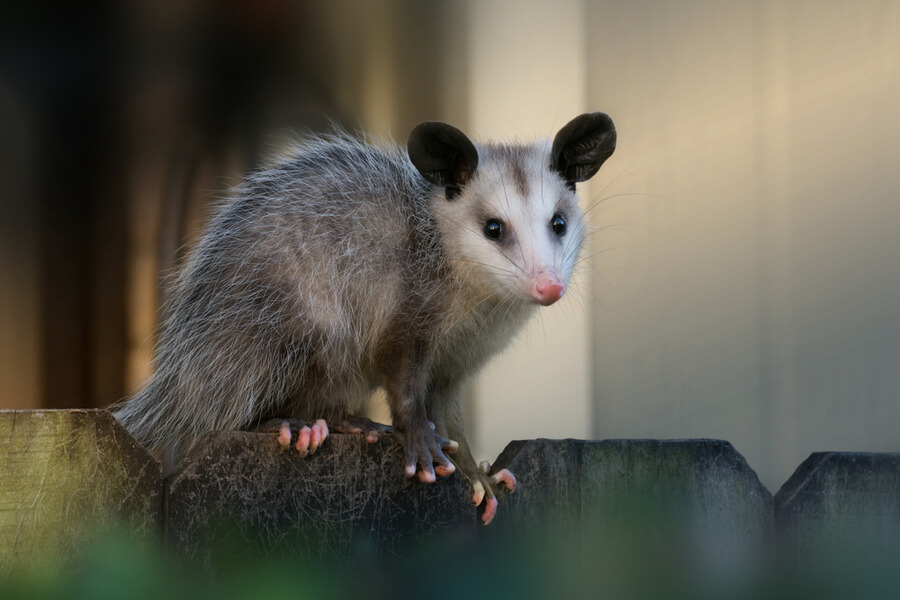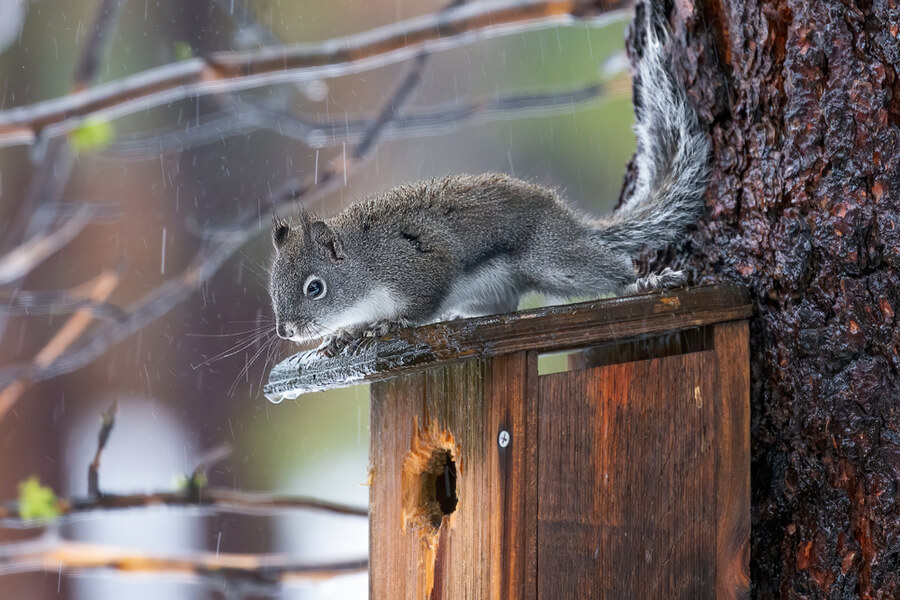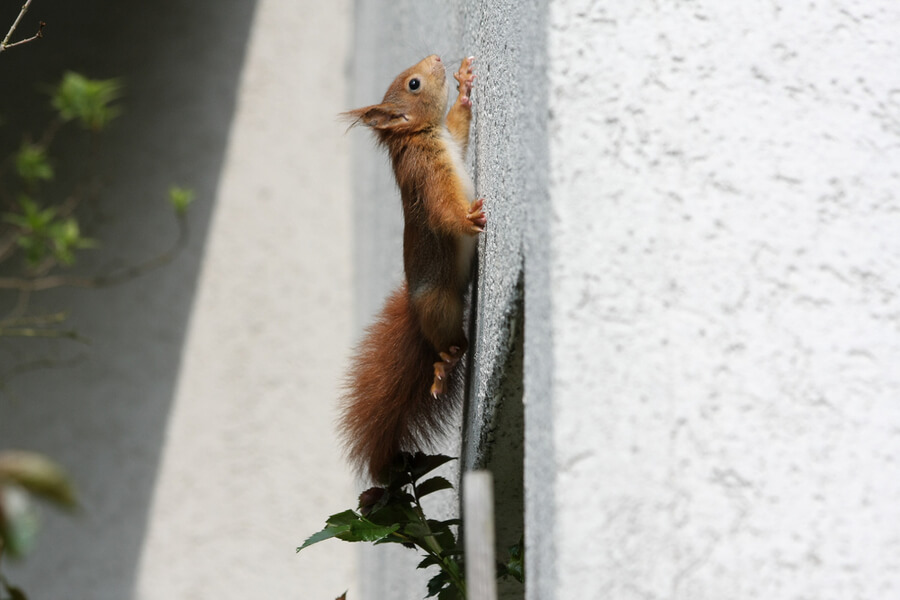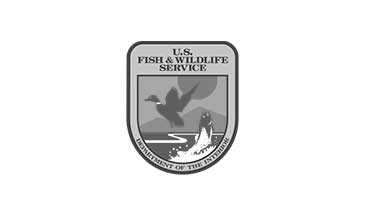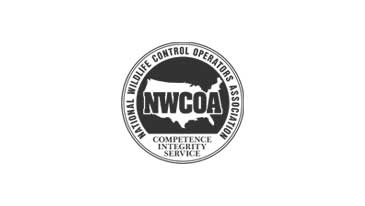What are opossums?
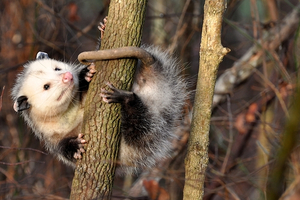 Even if you don’t know what a opossum is, you’d probably recognize one if you saw it. Opossums (Didelphis virginiana) are white or grey, furry creatures with pointed snouts, round ears, and a long, hairless prehensile tail. Their fur is often coarse or matted down, which may give them a rat-like appearance. Opossums are 2 to 3 feet long, and can weigh anywhere between 4 to 15 pounds.
Despite their appearance and pest-proclivities, opossums aren’t considered rodents. Instead, they're classified as marsupials, making them the only marsupials native to North America. Like other marsupials (such as kangaroos), mothers carry their young in an abdominal pouch. Opossums give birth in March and April, and may have litters of anywhere between five and twenty five young. Any of the pests encountered after breeding season may have their offspring with them or nearby at all times.
Even if you don’t know what a opossum is, you’d probably recognize one if you saw it. Opossums (Didelphis virginiana) are white or grey, furry creatures with pointed snouts, round ears, and a long, hairless prehensile tail. Their fur is often coarse or matted down, which may give them a rat-like appearance. Opossums are 2 to 3 feet long, and can weigh anywhere between 4 to 15 pounds.
Despite their appearance and pest-proclivities, opossums aren’t considered rodents. Instead, they're classified as marsupials, making them the only marsupials native to North America. Like other marsupials (such as kangaroos), mothers carry their young in an abdominal pouch. Opossums give birth in March and April, and may have litters of anywhere between five and twenty five young. Any of the pests encountered after breeding season may have their offspring with them or nearby at all times.
Where did they come from?
Opossums are solitary, nomadic animals. They wander around to anywhere they can find food, warmth, and shelter from predators. Unlike many pest animals, they move their dens every few days to avoid predators and seek food. A opossum can build a temporary den just about anywhere and out of just about anything. Opossums generally tend to gravitate toward places where food is abundant. They can eat just about anything, so they’re usually found in forests and other areas where natural vegetation is highly abundant. Usually, the only reason they come near your home is because they wandered over from a different nearby food source. Opossums are highly-proficient tree climbers. Although they spend most of their time on the ground, they may occasionally make nests, flee, or hide higher up.What do they want?
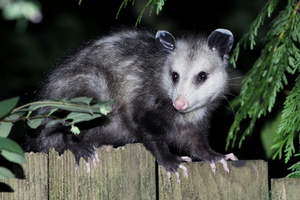 Opossums are highly opportunistic scavengers. They’re basically just looking for some easy food and accessible shelter. Homeowner’s garbage can often satisfy both requirements, making it an ideal opossum destination. They're nocturnal foragers, so if you run into them it’ll probably be at night and near trash.
Along with food and shelter, opossums like to stay warm. Opossum fur is thin and doesn’t provide the animal with very much insulation. To compensate, they have to either find warm places or make rudimentary nests. Opossums make their nests out of pretty much anything they can find, including dry leaves, insulation, and non-edible garbage.
Opossums are highly opportunistic scavengers. They’re basically just looking for some easy food and accessible shelter. Homeowner’s garbage can often satisfy both requirements, making it an ideal opossum destination. They're nocturnal foragers, so if you run into them it’ll probably be at night and near trash.
Along with food and shelter, opossums like to stay warm. Opossum fur is thin and doesn’t provide the animal with very much insulation. To compensate, they have to either find warm places or make rudimentary nests. Opossums make their nests out of pretty much anything they can find, including dry leaves, insulation, and non-edible garbage.
Are they dangerous?
Most people are familiar with opossums for their famous “playing ‘possum” defense mechanism. When threatened, the pest sometimes reflexively enters a state of torpor. They lie perfectly still and emit a foul odor to trick predators into thinking they’re dead. A frightened opossum may also growl, hiss, bare their teeth, or emit foul-smelling odors. Though they rarely bite humans, it can happen. They may also get into fights with pets, or attack livestock (such as chickens) on your property. Unfortunately, opossums carry and transmit several dangerous diseases that can be transmitted to humans. They may carry tuberculosis, tularemia, leptospirosis, spotted fever, and more. Humans could contract these diseases via contact with opossum fur, waste, blood, or saliva. Opossum fur also attracts fleas, ticks, mites, and lice, which in turn also carry human-transmittable diseases.What should I do about them?
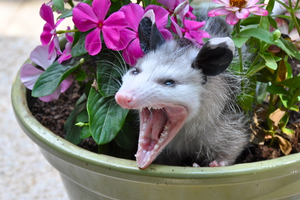 When opossums are near your home, they’re looking for food, shelter, and warmth. The way to drive them away from your home is to deprive them of these things. Close off access to areas where a opossum could hide, burrow, or build nests. Block off the underside of your deck and screen off the opening under porch stairs. Make sure a opossum can’t burrow under gates and fences. Exclude them from your garden by installing chicken fencing.
Remember: these pests are all about easy food. Garbage, in particular, will attract them like nothing else. When you take garbage out to your dumpster, make sure you keep all of it in airtight plastic bags. Rinse out any disposable containers before you toss them out. Clean out your dumpster about once every two months to make sure the smell doesn’t attract opossums. Keep your dumpster or can inside your garage if possible, and tie it down with a bungee cord or rope.
Last but not least: remember that if you ever have an opossum problem, you don’t have to deal with it yourself. You can always call in the experts at Varment Guard.
We can remove any opossoms on your property before they have a chance to harm anyone or anything. After all, guarding against varments is what we do.
When opossums are near your home, they’re looking for food, shelter, and warmth. The way to drive them away from your home is to deprive them of these things. Close off access to areas where a opossum could hide, burrow, or build nests. Block off the underside of your deck and screen off the opening under porch stairs. Make sure a opossum can’t burrow under gates and fences. Exclude them from your garden by installing chicken fencing.
Remember: these pests are all about easy food. Garbage, in particular, will attract them like nothing else. When you take garbage out to your dumpster, make sure you keep all of it in airtight plastic bags. Rinse out any disposable containers before you toss them out. Clean out your dumpster about once every two months to make sure the smell doesn’t attract opossums. Keep your dumpster or can inside your garage if possible, and tie it down with a bungee cord or rope.
Last but not least: remember that if you ever have an opossum problem, you don’t have to deal with it yourself. You can always call in the experts at Varment Guard.
We can remove any opossoms on your property before they have a chance to harm anyone or anything. After all, guarding against varments is what we do.

